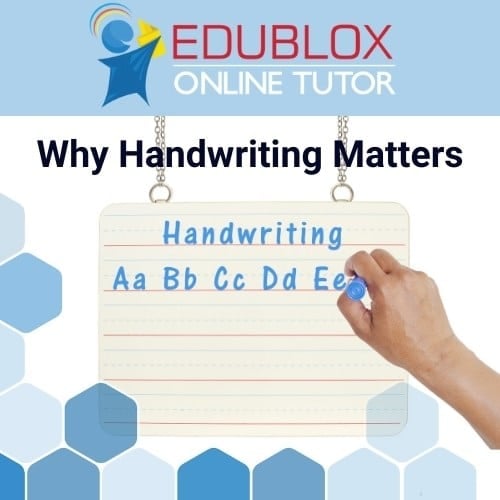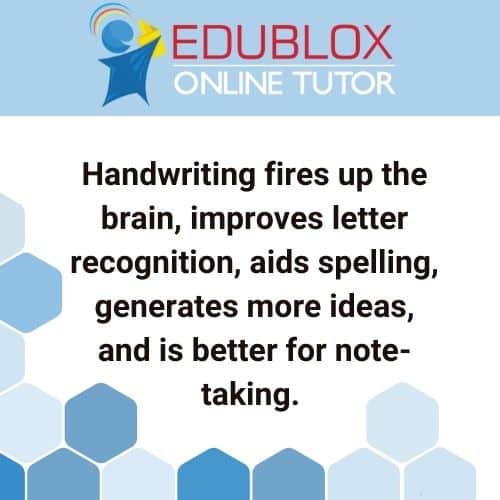
It’s a fair question for parents to consider: Why should my child learn to master the skill of handwriting in a world governed by keyboards? Isn’t the mere notion of teaching this skill as archaic as attempting to master trigonometry without using a scientific calculator?
Before answering, we must understand that writing and handwriting are not the same things. While some of us may use the words interchangeably, we need to understand the difference:
- Handwriting refers to letter formation. It is the act of learning to write the letters of the alphabet. It is also the act or process of writing done with the hand rather than typed or word-processed.
- Writing is communicating an idea so that others understand your message.
Handwriting, or “penmanship,” has played an integral role in the education of many generations of schoolchildren. It is part of the second educational triumvirate of reading, writing, and arithmetic.
But as laptops and tablets became more commonly used as writing tools, many were ready to leave the skill of handwriting behind. People were convinced that most students would do most of their writing on computers, so educators should get them started on keyboarding skills early. For example, some schools in Norway became completely digital and skipped handwriting training altogether. Finnish schools are even more digitized than Norway. Very few schools offer handwriting training.
A growing body of research, however, is leading psychologists and neuroscientists to emphasize the importance of teaching handwriting, even in the era of computer keyboard instruction. The pen, it seems, is mightier than the keyboard!
1. Handwriting fires up the brain
James and Engelhardt (2012) presented children who had not yet learned to read and write with a letter or a shape on an index card and asked them to reproduce it in one of three ways: (1.) trace the image on a page with a dotted outline, (2.) draw it on a blank white sheet, or (3.) type it on a computer. They were then placed in a brain scanner and shown the image again.
The researchers found that the initial duplication process mattered a great deal. Children who had drawn a letter freehand exhibited increased activity in three areas of the brain: the left fusiform gyrus, the inferior frontal gyrus, and the posterior parietal cortex; these same areas are activated in adults when they read and write. By contrast, children who typed or traced the letter or shape showed no such effect.
2. Handwriting improves letter recognition
Whether it be the differentiation of the shape of a circle from a square or the letter B from P, the ability to perceive and recall the shapes of objects is an essential skill for the developing child to acquire. There is hardly an academic activity that does not require the child to engage in form discrimination.
Since they must learn how to coordinate their hand movements accurately and produce the shape of each letter, learning to write develops form perception and, in turn, improves letter recognition (Longcamp et al., 2005).
Letter recognition is the ability to call out a letter shown or pick out a letter in a group of letters. Recognition of letters is a foundational part of learning how to read. Without it, kids struggle to learn letter sounds and recognizing words.
Hulme compared children’s learning of a series of abstract graphic forms, depending on whether they looked at the shapes or looked at them while tracing the outlines with their index finger. The tracing movements improved the children’s memorization of the graphic items.
3. Handwriting aids spelling
The relationship between handwriting and spelling has been the subject of a growing scientific investigation. Spelling is a language-based skill under cognitive control, while handwriting is generally seen as a psychomotor skill under motor control.
Despite their separate origins, the two skills are interrelated and correlated. For example, over two experiments, Cunningham and Stanovich (1990) found that training involving writing results in better spelling performance than when training is carried out with letters tiles or computers.
A study by Graham et al. (2018) demonstrates that explicit and supplemental handwriting and spelling instruction can play an important role in teaching writing to young children who acquire text transcription skills more slowly than their peers.
4. Handwriting generates more ideas
In a study that followed children in grades two through five, Berninger and colleagues (2006) demonstrated that printing, cursive writing, and typing on a keyboard are all associated with distinct and separate brain patterns — each resulting in a different end product. When the children composed text by hand, they not only consistently produced more words more quickly than they did on a keyboard, but they also expressed more ideas.
Brain imaging in the oldest subjects suggested that the connection between writing and idea generation went even further. When these children were asked to come up with ideas for a composition, the ones with better handwriting exhibited greater neural activation in areas associated with working memory — and increased overall activation in the reading and writing networks.
5. Handwriting is better for note-taking

Dust off those Bic ballpoints and college-ruled notebooks: research showed that note-taking by hand is better than taking notes on a laptop.
Across three experiments, Mueller and Oppenheimer (2014) instructed half of the college students to take notes with a laptop and the other half to write them out by hand.
Students who used laptops took more notes. In each study, however, those who wrote their notes by hand had a stronger conceptual understanding and were more successful in applying and integrating the material than those who took notes with their laptops.
“Our findings suggest that even when laptops are used as intended ― and not for buying things on Amazon during class ― they may still be harming academic performance,” said Mueller, lead author of the study.
The bottom line
The pen is mightier than the keyboard. Handwriting matters because it fires up the brain, improves letter recognition, aids spelling, generates more ideas, and is better for note-taking. Keep writing!
